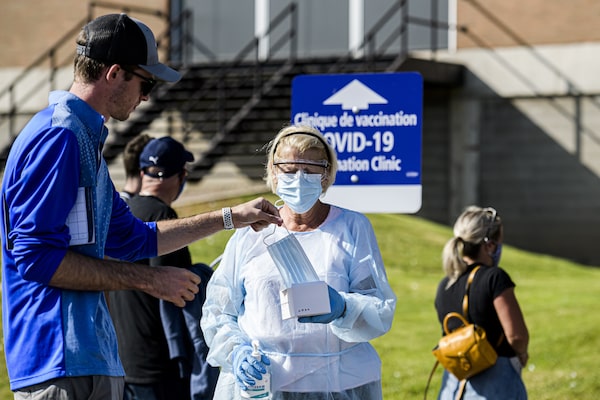Good evening, here are the COVID-19 updates you need to know tonight.
Top headlines:
- As provinces ask people to manage their own COVID-19 risks, experts say the public has less data
- Ottawa public school trustees to vote on mask mandate for students and staff, even though province has said face coverings are no longer mandated
- Shanghai eases two-week COVID-19 shutdown, allowing some residents to leave their homes
There were 254 deaths announced in the past seven days, down 17 per cent over the same period. At least 5,320 people are being treated in hospitals.
Canada’s inoculation rate is 14th among countries with a population of one million or more people.
Sources: Canada data is compiled from government websites, Johns Hopkins and COVID-19 Canada Open Data Working Group; international data is from Johns Hopkins University.
Coronavirus explainers: Coronavirus in maps and charts • Tracking vaccine doses • Lockdown rules and reopening
Photo of the day

A health practitioner helps people as they wait in line at a mass vaccination and testing clinic at the Moncton Coliseum in N.B. on Sept. 22, 2021.Christopher Katsarov/The Canadian Press
Coronavirus in Canada
- In Ontario, 1,366 people are in hospital with COVID-19 today, and 190 in intensive care, compared with 1,090 hospitalizations on Monday, and 184 in ICUs. Meanwhile, trustees at Ottawa’s public school board are expected to vote on whether to require students and staff to wear masks, even though the province has said masks are no longer mandated.
- Quebec is reporting a jump in hospitalizations with 145 patients and 35 more deaths.
- In New Brunswick, 10 more people have died from the virus and ICU patients are up, while Prince Edward Island is reporting two more COVID-19 deaths.
While provincial governments tell Canadians to estimate their own sense of risk, experts say the public has less data to make those risk assessments.
- Chief Public Health Officer Dr. Theresa Tam said today that public access to information about where the virus is spreading and who it is impacting needs to improve so people can make informed decisions.
Shelters and COVID-19: A new report from Statistics Canada shows the effects of the pandemic on shelters for people fleeing abuse. There was a 49 per cent increase in the number of crisis calls when compared to before the pandemic, and 61 per cent of the facilities reported reducing their number of beds to mitigate the impacts of COVID-19.
Listen: On The Decibel podcast, health reporter Carly Weeks talks about why Canadians haven’t been getting their boosters, and why they really should.
Coronavirus around the world
- Shanghai has eased its two-week COVID-19 lockdown for some residents, with around 6.6 million people allowed to go outdoors, though they must stay in their own neighbourhoods.
- In the U.S., the BA.2 Omicron subvariant is now responsible for 86 per cent of all U.S. COVID-19 cases, and in the Northeast, that number rises to more than 90 per cent of infections, according to CDC data.
- U.K. Prime Minister Boris Johnson, his wife, and his finance minister Rishi Sunak were fined for breaching laws his government brought in to curb COVID-19.
Coronavirus and business
New International Monetary Fund research shows that a supply chain that originates from more countries and inputs can significantly reduce the economic drag from supply disruptions. Their message? Don’t dismantle global supply chains, diversify them.
- Researchers simulated a lockdown like the ones that took place in China in early 2020, and said that reducing labour supply by 25 per cent in a single large supplier of intermediate components prompted an 0.8 per cent decrease in the average economy’s output.
- But with higher diversification among where supply came from, the decline would be reduced by about half, to about 0.4 per cent. Even in scenarios where there are shocks to multiple countries, high source diversification reduces the level of GDP decline by about 5 per cent.
Globe opinion
- J. Kelly Nestruck: From Stratford to Broadway, live theatre is already well aware we’re in a sixth wave, thanks
Information centre
- Everything you need to know about Canada’s travel rules for vaccinated and unvaccinated people
- Where do I book a COVID-19 booster or a vaccine appointment for my kids? Latest rules by province
- Got a vaccine 'hangover'? Here's why
Sources: Canada data are compiled from government websites, Johns Hopkins University and COVID-19 Canada Open Data Working Group; international data are from Johns Hopkins.
What are we missing? E-mail us: audience@globeandmail.com. Do you know someone who needs this newsletter? Send them to our Newsletters page.